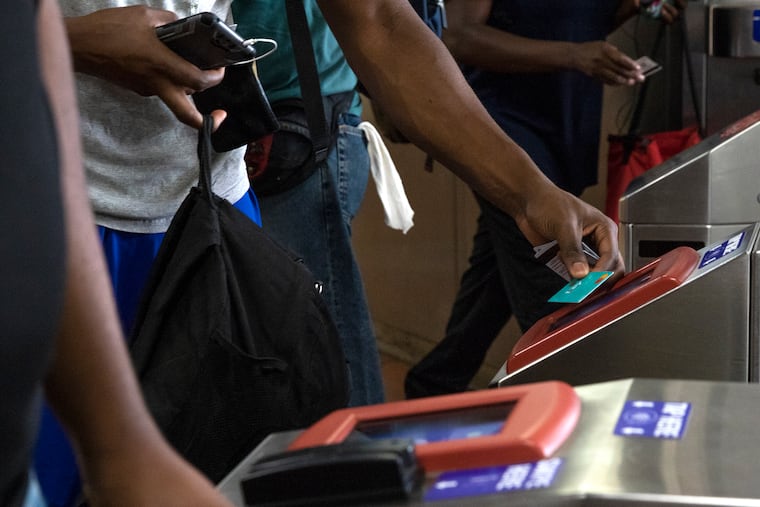SEPTA’s digital fare card hurts the city’s poor, advocate says
"From the beginning of the ride, the current system seems to put those unbanked and without credit cards at a disadvantage," said Lance Haver, policy director for Saving Our Safety Net.

SEPTA is closing in on its goal of making the Key card the standard fare system for the region's public transit service.
As of last month, 980,000 cards had been sold, SEPTA officials said, and on city transit between 70 percent to 80 percent of fares are paid with the smart card. The cards can be used for monthly or weekly fare plans, can maintain a balance to pay for trips, or can be loaded with money as needed by infrequent transit users. SEPTA is unveiling the system for Regional Rail, the last major service that hasn't widely converted to Key.
This conversion to a digital fare system, though, won't work for the city's poor, argued Lance Haver, policy director of Pennsylvania Save Our Safety Net Coalition, a group advocating for government social services.
"For those tens of thousands of riders who don't have credit cards, who are unbanked, we should be asking if the Key card is an improvement, or does it make it more costly to ride SEPTA?" Haver said at SEPTA's monthly board meeting Thursday.
Lacking a bank account or credit or debit card makes it impossible for card holders to reload their cards automatically through SEPTA's website. Key card dispensing kiosks at all SEPTA subway stations allow a card to be reloaded with cash, but Haver noted that many transit users in the city, particularly bus riders, don't use the Broad Street or Market-Frankford Lines and would have to go out of their way — and spend money for an extra trip — to reach a subway station kiosk.
Noting that 42 percent of SEPTA's riders have incomes under $35,000 a year, Haver called for the board to form a committee to review how Key may make transit more expensive for the city's poor. Riders can still pay for SEPTA fares with cash, but a trip costs $2.50, compared to $2 with a Key card.
SEPTA officials will meet with Haver, said Rich Burnfield, SEPTA's deputy general manager and treasurer, though he did not commit to forming a committee.
Haver said the hardest transition for the poor has been SEPTA's substitution of the fare card for tokens, which for years were sold at corner shops and convenience stores. The Key program calls for 1,500 businesses around the city to sell the cards, but about two years into its use on city transit, they are sold at only about 500 businesses, Burnfield said.
Card users have told Haver that businesses that do provide Key cards charge service fees of up to $2 to reload a card, something SEPTA officials say should not happen.
Other issues Key users complain about make travel even more complicated, Haver said. Key card validators don't give any warning when a card is close to a zero balance, he noted, and SEPTA's app doesn't make it easy to find locations where Key cards can be bought.
"From the beginning of the ride, the current system seems to put those unbanked and without credit cards at a disadvantage," Haver said.
He also criticized the function that allows the transit card to be used as a debit card. The debit function, administered by Metabank, includes significant fees, including $4.95 in monthly fees and $3 to receive a paper transaction summary by mail. Haver called the charges predatory. Burfield said the fees were in line with those associated with prepaid debit cards. Fewer than 100 people are using the Key card's debit function, he said.
Burnfield wanted more information on businesses that were charging service fees to reload cards for transit purposes. SEPTA has tried to make the card more accessible to the poor with a minimum reload value of $5 instead of $10, and by unrolling round-trip and one-way options for social service agencies that have traditionally handed those out to clients.
"We're going to meet with him," Burnfield said of Haver. "We want to serve our customers."